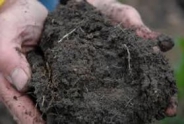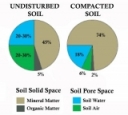Soil
 Soils are the foundation of our production systems. Soils are fragile yet resilient if we care for them. In a practical sense we have to manage them for fertility, compaction and breaking pest cycles with crop rotation. An array of information addressing soils can be found here.
Soils are the foundation of our production systems. Soils are fragile yet resilient if we care for them. In a practical sense we have to manage them for fertility, compaction and breaking pest cycles with crop rotation. An array of information addressing soils can be found here. SOIL CATEGORIES
On-Farm Research: Power Of Manure Project 2025

Power of Manure Project 2025 Research questions:
• How much nitrogen (N) can my soil supply?
• How does past manure, crop, and soil management impact soil N supply?
• Can soil microbial biomass predict soil N supply on my farm?
On-Farm Research: Value of Manure Project 2025
Janice Degni, Team Leader, Field Crop Specialist
South Central New York Dairy & Field Crops

Value of Manure Project 2025
Research questions:
- How much nitrogen can be credited to manure?
- What is the yield impact of fall or spring manure applications in grain and silage corn?
- What is the microbial biomass impact of manure application?
The Slow and Furtive Nature of Pasture Soil Compaction: Project Develops Ratio..
A. Fay Benson, Small Dairy Extension Educator
South Central New York Dairy & Field Crops

In my work, first as a grazing dairy farmer and now as a Cornell University Cooperative Extension educator working with graziers across New York State, I have been aware of pasture soil compaction but one experience in particular gave me the insight into the slow and furtive nature of compaction in pastures. This article summarizes my findings from a three-year, Northeast Sustainable Agricultural Research and Extension (NESARE)-funded project developed to better understand soil compaction in pastures.
A Possible New Technique To Monitor Soil Compaction
A. Fay Benson, Small Dairy Extension Educator
South Central New York Dairy & Field Crops
A Northeast Sustainable Agricultural Research and Extension (NESARE)-funded project conducted by Cornell educators has begun evaluating a possible new technique for monitoring and managing soil compaction specifically in pastures. This article provides a summary of that project; the results may have implications for future use in managing pastures and other types of production land
Tillage and Planting Reminders in a Wet Spring
Tom Kilcer outlines some precautions to prevent compaction when tilling and planting under wet conditions with some other spring tips
NYSERDA Agriculture Energy Audit Program - Fact Sheet
Janice Degni, Team Leader, Field Crop Specialist
South Central New York Dairy & Field Crops
NYSERDA offers energy audits to help eligible farms and on-farm producers identify ways to save energy and money on utility bills. Reports include recommendations for energy efficiency measures.
Webinar Series On Organic Weed Management
Janice Degni, Team Leader, Field Crop Specialist
South Central New York Dairy & Field Crops
Organic farmers and specialists from across the U.S. led a free webinar series on organic weed management. The webinars discuss several approaches and practices for managing weeds including crop rotations, cover crops, and soil management. Each session was recorded. They can be viewed here.
Variable Rate Fertility Management
Bill Verbeten, Field Crops
Northwest New York Dairy, Livestock & Field Crops

An expanded version of the February 2014 Ag Focus Article, Variable Rate Fertility Management.
Cover Crop InterSeeder
Bill Verbeten, Field Crops
Northwest New York Dairy, Livestock & Field Crops

Want to plant a cover crop into standing corn or soybeans, apply a herbicide, and sidedress nitrogen all in one pass? Check out the cover crop InterSeeder developed at Penn State in this PDF. For additional information go to InterSeeder website.
Illinois Soil Nitrogen Test (ISNT)
Bill Verbeten, Field Crops
Northwest New York Dairy, Livestock & Field Crops

Curious about what the ISNT soil test is and how to use it? Download this Cornell Agronomy Fact Sheet describing the Illinois Soil Nitrogen Test. More Agronomy Fact Sheets are available at the Cornell Nutrient Management Spear Program website.
Soil Sampling for Field Crops
Bill Verbeten, Field Crops
Northwest New York Dairy, Livestock & Field Crops

Not sure how to sample your soil? Download this Cornell Agronomy Fact Sheet. More Agronomy Fact Sheets are available at the Cornell Nutrient Management Spear Program website.
Mapping Management Zones with Soil Conductivity
Bill Verbeten, Field Crops
Northwest New York Dairy, Livestock & Field Crops

Interested in creating soil management zones with soil conductivity on your farm? Download this PDF.
Upcoming Events
CCE Cayuga 2026 Winter Shop Meeting
February 3, 2026 : CCE Cayuga 2026 Winter Shop Meetings
Moravia, NY
Topics:
- Weed Strategies and Control Strategies
- Neonicotinoid Seed Treatment Update
- Disease Issues in Field Crops
- Corn Rootworm Control
Virtual Climate Resiliency Webinar and Workshop Series
January 27, 2026
February 3, 2026
February 10, 2026
February 17, 2026
: Virtual Climate Resiliency Webinar and Workshop Series
New York Annie's Project: How to Diversify or Scale with Confidence for Profitability
February 4, 2026 : How to Diversify or Scale with Confidence for Profitability
Wednesdays, February 4th, 11th & 25th (skip 2/18)
11:30am-1pm via Zoom
Announcements
Farm Participants Needed for Bale Grazing Grant!
Information on the Project:- Approximately 10 acres total needed to bale graze two different bale densities
- "Core" farms will graze two winters, "Demo" farms will graze one winter.
- Payments for both "Core" farms and "Demo" farms
- Baseline soil sampling by bale grazing team
- Forage measurements in early season by bale grazing team
- Late season clipping if residual not trampled down by farm
Cornell Cow Convos - New Podcast
On-going podcast, New episodes released on the last Thursday of the month.Guest speakers, CCE Dairy Specialists.
Housed on Soundcloud Channel is CCE Dairy Educators
- Preventative healthcare for cows
- The trend of beef on dairy
- What to look forward to in the new year for dairy
- Socially grouping or pair-housing calves
2018 Drug Residue Prevention Manual
For more than 30 years, the U.S. dairy industry has focused educational efforts on the judicious use of antibiotics through the annual publication of a Best Practices Manual. The 2018 edition of the National Dairy FARM Program: Farmers Assuring Responsible Management? Milk and Dairy Beef Drug Residue Prevention Manual is the primary educational tool for dairy farm managers throughout the country on the judicious and responsible use of antibiotics, including avoidance of drug residues in milk and meat.The manual is a quick resource to review those antibiotics approved for dairy animals and can also be used as an educational tool and resource for farm managers as they develop on-farm best management practices necessary to avoid milk and meat residues. Visit the Manual and Form Library to download copies of this important tool!
Follow us on Facebook
The team updates our facebook page frequently - follow us to be updated on our events, see some fun videos and get local area updates!facebook.com/SCNYDairyandFieldCropsTeam
NYSERDA Agriculture Energy Audit Program
NYSERDA offers energy audits to help eligible farms and on-farm producers identify ways to save energy and money on utility bills. Reports include recommendations for energy efficiency measures.For more information and the NYSERDA Agriculture Energy Audit Program Application click here






